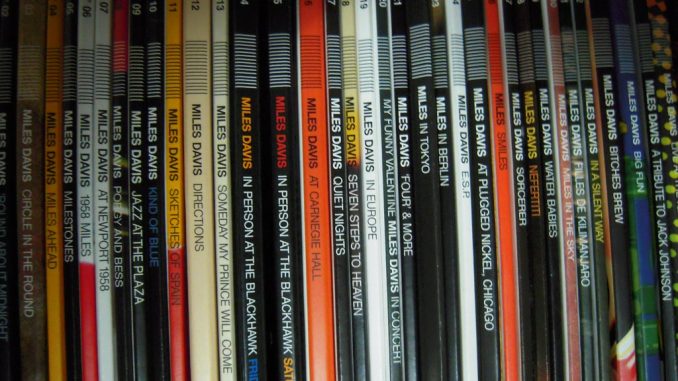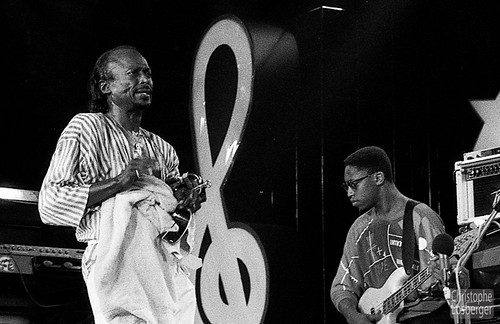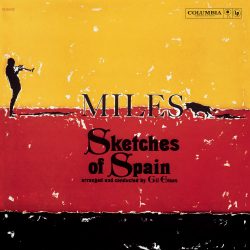
I have a guilty secret; I’m a jazz fan and it’s pretty much all Miles Davis’ fault.
Back in the 80s, I was a jobbing tour and production manager, working with various bands on the road and in concert; I also worked on a number of festivals at that time, one of which was the Capital Jazz Festival. I wasn’t a jazz fan then, in fact, it would be fair to say I couldn’t stand the music – it was discordant, it swung where I wanted to rock, guitar – my instrument of choice – was rarely a featured instrument. Everything about it was wrong from my point of view, but I soon began to suspect that, in general, jazz musicians could be that bit easier to work with than rock musicians. They tended to be a little older and less given to wrecking hotel rooms and starting food fights in restaurants. I still enjoyed the fun and excitement, and the music, of working with rockers but, every so often, it was nice to have an opportunity to make a little easier money so, via my work with the Jazz Festival, I started to look for jazz musicians to work with from time to time. I quickly realised that my generalisation was a bad one and that some jazz musicians could be extremely difficult to work with – an early discovery that generalisation is rarely accurate. Then, along came Miles Davis and took “difficult” to a whole different level.
Our first encounter was in 1982. The promoters I was working with, a company called IMCP, had connections with the then-fledgling Channel 4 and were asked if they could come up with an event that would help to launch the channel. Through their connections with George Wein’s Festival Productions in New York, they were able to line up a Miles Davis concert for a live broadcast from Hammersmith Odeon. I was their production manager and had to handle the liaison with Davis’ technical crew. This limited my exposure to the great man himself – something I was grateful for because he did most of his communicating in a mumbled growl, accompanied by a glare that could take the paint off the wall at 20 paces! It would be fair to say I found him intimidating. Davis had a well-established reputation for being “difficult” by this time. As his then manager commented to the promoters at one point, “there are two things Miles hates, white promoters and TV producers and you’re both”! The gig was on and off a couple of times. First, he wasn’t going to do the TV broadcast, then he decided he would – it was a stressful event, to put it mildly. I wanted to be as far away from it all as I could get but it did all go ahead and something special happened that night. It was a cathartic moment for me, standing in the wings listening to Miles Davis and his band. It was all-consuming and I loved it. The band in ’82 was outstanding. A young Mike Stern on guitar, who was an incredible talent, Al Foster on drums, Mino Cinelo on percussion, Bill Evans playing sax, and the outstanding Marcus Miller on bass. It suddenly all made sense as music and it was all down to Miles Davis. He didn’t play a lot that night, his health wasn’t great at the time and he spent as much time at the keyboards as he did playing the horn, but it was the way he ran the show and directed the musicians, knowing just who to give solos to and when, knowing when to bring those solos to a close, who to feature next – it was enthralling to watch. He played three nights and I don’t remember which one was recorded for broadcast but, for me, it just got better and better.
Two years later he came back again, this time for the Capital Radio Jazz Festival at the Royal Festival Hall. The same promoters were involved and I was working on the production team again. He was no more pleasant to work with than he had been the first time, constantly changing his backstage requirements, constantly threatening not to play – but play he did and magnificently. He’d added a second guitarist to the line-up with John Scofield and the combination of Scofield and Stern was amazing. I think there were other personnel changes but I don’t remember them after all this time but Miles Davis was playing more like his old self and stalked the stage with that hunched lope of his, glaring at everyone. Whatever Miles did he was always watchable and had great stage presence. I’m pretty sure it was at this concert that I first heard his version of Cindy Lauper’s ‘Time After Time’ and it made the hairs on the back of my neck stand up – and still does to this day.

Miles Davis changed the way I listened to music. He once said, “there are no wrong notes in jazz: only notes in the wrong places…..It’s not the note you play that’s the wrong note – it’s the note you play afterwards that makes it right or wrong”. Once you get that, jazz makes perfect sense; it’s always about what comes next and that’s why jazz is always fascinating. It’s the thrill of wondering where it’s going and what turns it will take. Even on a recording, jazz can be unpredictable in a way that rock or blues, folk or country never could be. You don’t have to follow the rules, you just have to understand how to interpret them. Having started with Miles I quickly started to take in other jazz artists and different styles and genres of jazz music. I remember almost laughing out loud when I discovered the brilliance of Dave Brubeck’s ‘Blue Rondo a la Turk’ and the wonderful absurdity of 9/8 timing – we’re no longer in Kansas, Toto – or any other straight-ahead rock band, come to that!
The other thing I learned from watching Miles Davis play is the truth of that old saying “what you don’t play is every bit as important as what you do play”. Davis was the master of unplayed music. I don’t believe anyone has ever made better use of pauses and the spaces between notes than Miles Davis; his sense of timing was always immaculate and his ability to know when not to play was second to none.
Through the brilliance of Miles Davis I’ve gone on to listen to a lot more jazz and there are now many jazz musicians who I listen to on a regular basis. I love the music of Keith Jarrett for its beautiful simplicity that is often so hard to achieve and, of course, isn’t remotely simple, he just makes it sound that way. For me, his piano playing is every bit as exquisite as Davis’ horn work and the brief period that Jarrett was in the Davis band has produced some of my very favourite music. I’m a Coltrane fan, of course, but also Thelonious Monk, the Modern Jazz Quartet, Chet Baker, Herbie Mann, Charlie Mingus, the wonderful voices of Ella Fitzgerald, Sarah Vaughan, and Nina Simone, the samba soaked work of Gilberto Gil, the township jazz of South Africa – it’s such a rich smorgasbord of sounds. Whenever I encounter someone who tells me “Oh, I don’t really like jazz” I know that he/she is really telling me that they haven’t, yet, found the right door. They haven’t found that one sound that turns the key and makes it all make sense. Of course, I always recommend they listen to Miles Davis; well, it worked for me.
 As someone who writes about Americana, I’m often asked what my favourite Americana album is – much like in our Top Ten Americana albums feature. I can’t definitively answer that question because, for me and, I think, many of the other writers here at AUK, that changes all the time, as you hear new albums and different artists come and go on your listening lists, but my favourite album of all time hasn’t changed since the first time I heard it. It’s the first name that goes on that desert island discs list every time – Miles Davis “Sketches of Spain”. When I first really heard Davis play, at that first Hammersmith gig, he was playing music from his “Man With the Horn” album and, for the first few months of being a convert to his music I stuck with the music from that era along with the classic fusion albums like “Bitches Brew” and “In A Silent Way”. Then I started listening to the big breakthrough albums, “Round About Midnight” and “Kind of Blue” – and then I discovered his work with Gil Evans and was transported yet again. I like all his work with Evans but “Sketches of Spain” is, to me, perfection. It’s the ideal Sunday morning record when you just want to immerse yourself into warmth and languor. It conjures up sunshine and dust and heat and it sparkles as a recording in a way that sets it aside from everything else.
As someone who writes about Americana, I’m often asked what my favourite Americana album is – much like in our Top Ten Americana albums feature. I can’t definitively answer that question because, for me and, I think, many of the other writers here at AUK, that changes all the time, as you hear new albums and different artists come and go on your listening lists, but my favourite album of all time hasn’t changed since the first time I heard it. It’s the first name that goes on that desert island discs list every time – Miles Davis “Sketches of Spain”. When I first really heard Davis play, at that first Hammersmith gig, he was playing music from his “Man With the Horn” album and, for the first few months of being a convert to his music I stuck with the music from that era along with the classic fusion albums like “Bitches Brew” and “In A Silent Way”. Then I started listening to the big breakthrough albums, “Round About Midnight” and “Kind of Blue” – and then I discovered his work with Gil Evans and was transported yet again. I like all his work with Evans but “Sketches of Spain” is, to me, perfection. It’s the ideal Sunday morning record when you just want to immerse yourself into warmth and languor. It conjures up sunshine and dust and heat and it sparkles as a recording in a way that sets it aside from everything else.
For all the grief Miles Davis gave me at those early 80s gigs he has more than made reparation through the joy his music has brought me. They say you should never meet your heroes, but I don’t think I agree. Miles Davis wasn’t a hero of mine when I met him, so I got to see the man, not the myth. He has become a hero to me because of his music and his true genius as a musician, but there was something else I observed when I was around him and his band at those gigs. For all his prejudices, misanthropy, and general dislike of the world around him, it never spilled over into his relationships with his band. When it came to musicians, Miles Davis didn’t see anything other than the musician. They may have been in his band but they were all in it together and they were each equally important in his eyes. That may have changed when he dismissed them or they left the band but, while they were in his circle, they were all equally important and they all served one master – the music.
For me, Miles Davis was a genius. It’s not a term I would use lightly but I truly think it is the only way to describe him. Now, some forty years after I first saw him and heard his music, I still get the same thrill when I put his music on and I can still see him stalking the stage. And that glare….I don’t think I’ll ever forget that glare!



Great article Rick. You never know, it might help other people to open the Jazz door. It always amazed me that Miles was always Miles, but his music also managed to perfectly reflect the times it was recorded in and also managed to be timeless at the same time.
Lovely piece Rick. I too succumbed to wonders of jazz a number of years ago when working as a Christmas temp at HMV. I ‘somehow’ ended up working in the jazz department and it was like I’d entered Narnia. Ive never looked back and every time I think I can see the light that takes me back home it turns out to be yet another rabbit hole marked ‘Japanese Jazz 1969 – 70’ or ‘The Music Of Lennie Tristan and all his disciples’.. I love jazz, its the room at the top of the stairs that one you enter there is no way out.
Great piece Rick, I’m another Jazz fan and i came to it through Miles. Decoy was the new album at the time, but the Birth of the Cool material from the 1940s was what drew me in. His “autobiography” was interesting reading and got me listening to Ornette Coleman and Ahmad Jamal. I did a talk about him recently and described him as the greatest musician of the 20th Century.